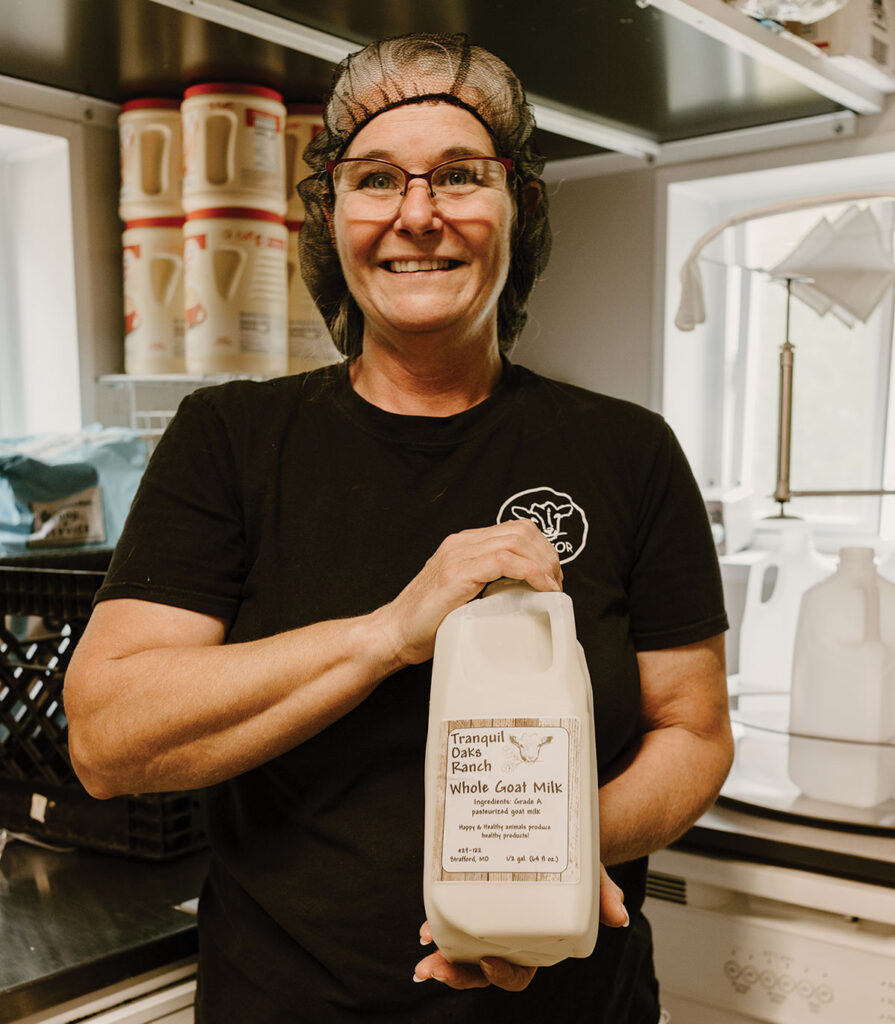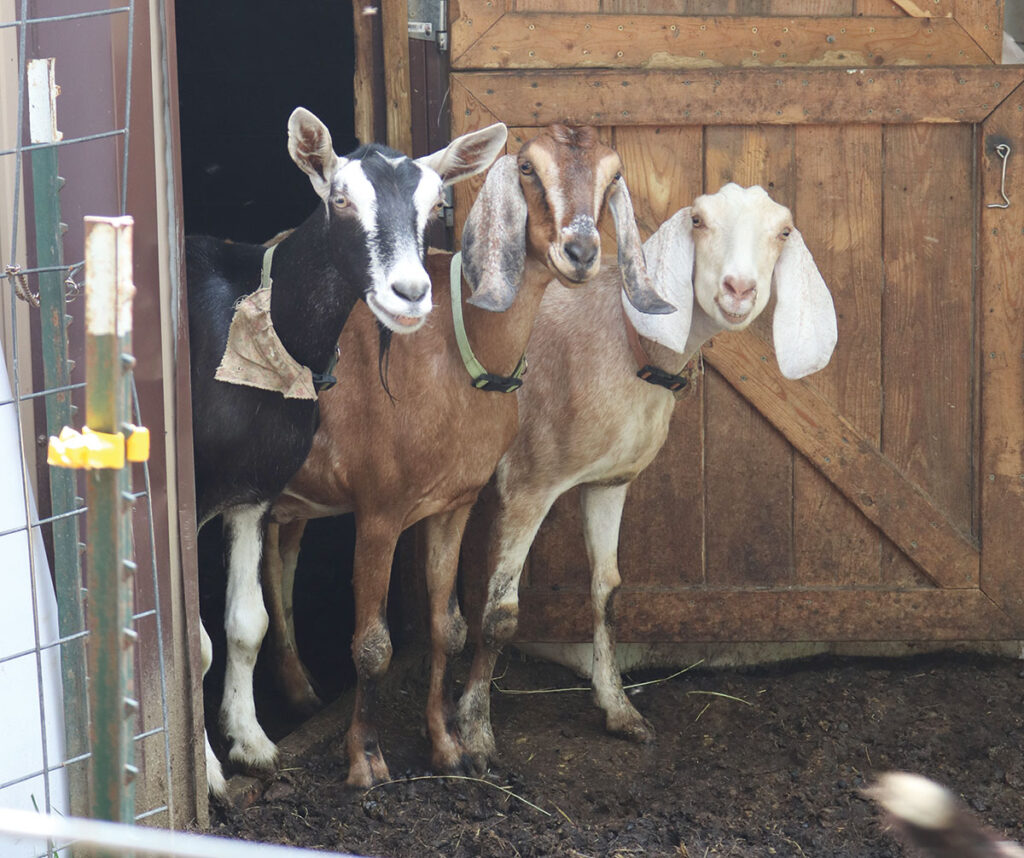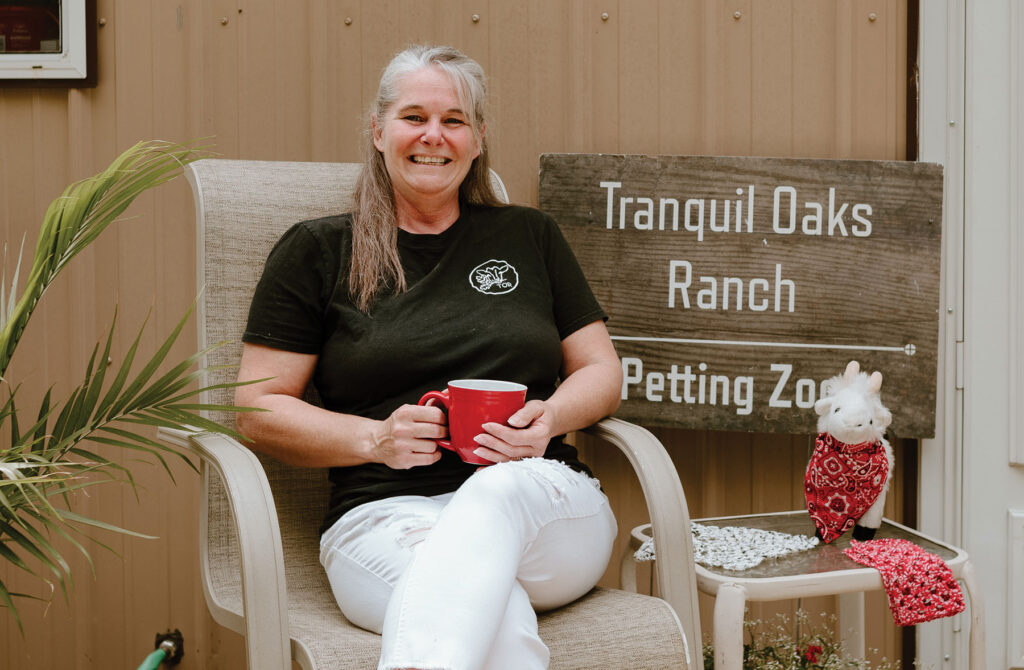
Shelly Householder operates Tranquil Oaks Ranch, a goat dairy near Strafford, Mo. Photo Courtesy of Briar River Photography
Tranquil Oaks Ranch is the state’s only Grade A dairy goat operation
STRAFFORD, MO. – On a freezing February Sunday afternoon several years ago, Shelly Householder and her husband Bryan were on their way home from church when Shelly spied something along the road.
“It was a baby goat,” Shelly recalled. “We stopped, brought it home, and its little ears were folded over and frozen. We looked all over for an owner but never found one. My husband said, ‘Honey, we can keep that goat, but everything has to contribute to the table.’”
Shelly said she could never eat her orphaned goat, so she got a dairy goat.
“I had to prove to Bryan that the purchase price of the goat was going to save us the price of milk for our family,” Shelly said. “We went to pick up our first goat, and I thought, what if I don’t like the taste of it? I got a dirty pop bottle out of the car and milked right into the bottle to make sure I would like it.”
Shelly did like the milk, and her milking herd began to grow.
That was about 10 years ago, and today, Tranquil Oaks Ranch is the only certified Grade A goat dairy in the state of Missouri, offering pasteurized whole and low-fat goat’s milk in regular and chocolate, flavored cheeses and cheese curds, and vanilla, chocolate and strawberry ice cream.
“We taste-test everything,” Shelly said with a laugh.
Starting a goat dairy came with a few hurdles for Shelly.
“My husband said we couldn’t make it as a dairy, then one year he hollered I had too many goats, so I sold two-thirds of my herd,” she recalled. “The next year, he said, ‘I’ve been thinking about it, and we really need to do the dairy.’”
A barn was on the ranch, but it took a couple of years to get it ready for Grade A certification, including running water to the barn, pouring concrete, and enclosing portions for the milk parlor and processing area. Shelly also purchased equipment to hold and process the milk, including a bulk tank and pasteurization equipment.
The county and state regularly inspect the facilities, and samples of milk are collected and tested monthly for bacteria and somatic cell counts, just as a dairy cow operation is inspected and tested. Tranquil Oaks Ranch holds four certifications: Grade A farm, Grade A dairy, Grade A manufacturing and Grade B manufacturing. The processing area is inspected and certified by the state and local health departments as well.
Because of its Grade A status, Tranquil Oaks Ranch can sell dairy products at farmers markets and retail outlets. Products can be found at MaMa Jean’s in Springfield, Mo., and will soon be in Harter House in Strafford, Mo. Shelly also has her “regulars” at the four farmers markets she participates in.

Nubians are the primary breed at the ranch. Shelly also has a few Alpines and a couple of Sables. The pendulous ears of the Nubians reminded her of her orphaned goat, but she found the breed offered the production qualities she wanted.
“I like the flavor of my milk, and the butterfat is higher [in the Nubians],” Shelly explained. “The only thing higher is a Nigerian Dwarf. The butterfat isn’t as high in the Alpines and Sables, but they give me greater volume.”
She does some crossbreeding, which helps her maintain the high butterfat and the quantity she desires.
Shelly averages about 10 does in milk year-round.
“Everyone in the whole world tells me that goats only cycle seasonally; that’s not true,” Shelly said. “They cycle every month but are more open [to breeding] in the cooler months. This year, I’m probably going to have to do some CIDRs. Last year, my rotational breeding didn’t work, and I had to be closed for two months, and I didn’t like that.”
In addition to natural cover breeding, Shelly has utilized AI in her herd.
At kidding, Shelly attends all births, cleans all goat kids, and feeds only pasteurized milk to the newborns to give them a healthy start and to prevent CAE. The herd also receives yearly vaccinations against the virus CDT.
Shelly monitors her herd closely for other health concerns, and worming is done as needed, following FAMACHA guidelines.
When she began her operation, the state milk board required all animals be tested for tuberculosis and brucellosis. Testing is not required of any offspring from those tested animals, but any new animals must be tested.
Shelly rotates bucks after three or four years to prevent inbreeding but sticks with the Nubian breed.
“I don’t want to lose that butterfat,” Shelly said. “The buck makes a lot of difference in your herd.”
Shelly retains the majority of her doelings for future breeding.
The herd currently is made up of 36 females. Buck kids typically go to the sale barn at about a month of age, but they now go to a young 4-H member starting a goat project at the Fisher Fanch.

Shelly and Tranquil Oaks Ranch follow a motto of happy and healthy animals.
“It’s all about the health of my animals,” she said.
Another way Shelly works to keep her animals healthy is through a specially formulated ration she developed with a nutritionist.
“I knew what I wanted in my feed, but he said I also needed this, this and this,” Shelly said. “It’s got alfalfa pellets, beet pulp, corn, lots of oats, sunflower seeds, and lots of vitamins and minerals. Because goats hate powdery feed, we had to be very careful about what we put in.
“I put in the sunflower seed because that raises the butterfat; the beet pulp raises the fluids they drink, making more milk. The more alfalfa they consume, the higher the quality and quantity of your milk. Corn helps generate their heat… I can go on and on.”
The care and the nutrition provided to the animals at Tranquil Oaks Ranch produces the high-quality milk Shelly uses for her dairy products, and she wants to utilize as many locally-produced items as possible to create her flavorful cheeses and cheese curds. She often shops with fellow vendors at farmers markets for the freshest ingredients.
“When cherry tomatoes are abundant, I buy a large quality, dehydrate them, and that’s what I put into my tomato-basil cheeses. It’s the same with my hot pepper cheeses,” Shelly explained.
Shelly has a few customers who prefer raw milk, and she obliges special requests.
“I have one customer who wants what we call SAS milk,” Shelly explained. “She wants Sable, Alpine or Saanen milk. The Nubian milk is too rich for her; she doesn’t like it. Either the Sable or the Sannen is too salty; one isn’t flavorful enough. When I give her a combination, however, she loves it. If I don’t make customers happy, I’m out of business.”
What started with a half-frozen kid goat found alongside a road has become much more for Shelly. She would like to expand and start her own storefront one day, but her goats will remain her joy even if that dream doesn’t come to fruition.
“This is my heart,” she said of her goat dairy. “I tried for years to convince my husband this is what I wanted to do, and now he’s sold all his cows and invested back into the dairy. He’s sold now.”







